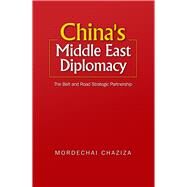China's Middle East Diplomacy The Belt and Road Strategic Partnership
, by Chaziza, Mordechai- ISBN: 9781789760569 | 1789760569
- Cover: Hardcover
- Copyright: 9/10/2020
The People’s Republic of China (PRC) diplomatic engagement with the Middle East spans multiple dimensions, including trade and investment, the energy sector, and military cooperation. Connecting China through the Suez Canal to the Mediterranean and Europe, the Middle East is a unique geostrategic location for Beijing, a critical source of energy resources, and an area of expanding economic ties.
The Middle East geographical and political area is subject to different country inclusion interpretations that have changed over time and reflect complex and multifaceted circumstances involving conflict, religion, ethnicity, and language. China considers most Arab League member countries (as well as Israel, Turkey, and Iran) as representing the Middle East. The Ministry of Foreign Affairs and official Chinese publications refer to this region as Xiya beifei (West Asia and North Africa). China sees the Middle East as an intrinsic part of its Belt and Road Initiative (BRI), and has ramped up investment in the region accordingly, focusing on energy (including nuclear power), infrastructure construction, agriculture, and finance.
This book uses the BRI as a framework for analyzing China–Middle East relations, with special emphasis on the PRC’s strategic partnerships via regional mutual interdependency in various sectors such as energy, infrastructure building, political ties, trade and investment, financial integration, people to people bonding, and defense. A stable Middle East region is vital for China’s sustainable growth and continued prosperity. As the world’s largest oil consumer with an ambition to expand its economic and political influence, the Middle East’s geostrategic location and holder of most of the world’s known energy resources make it indispensable to the success of the Belt and Road Initiative.






